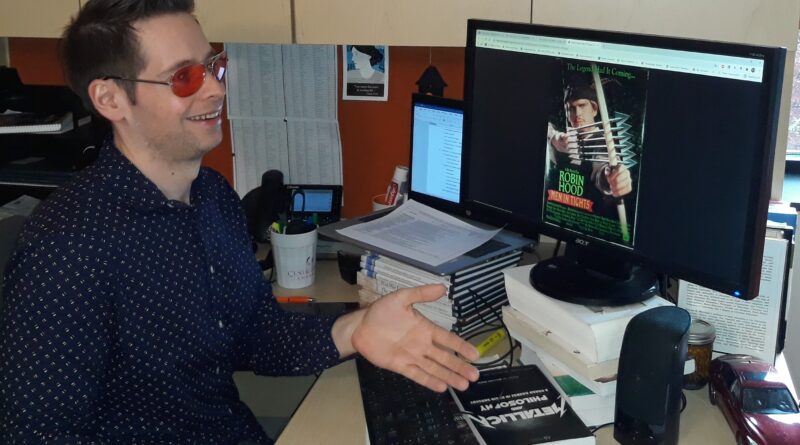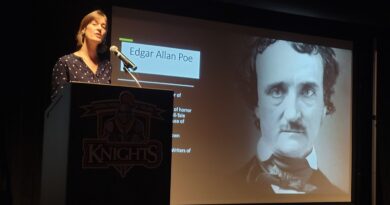Comedy is better without boundaries
The most recent feature in the CPC Film Series
was classic Mel Brooks. Folks liked it.

By Jenelle Dulack
jenelle.dulack@mymail.centralpenn.edu
and

Dylan Bowman
dylan.bowman@mymail.centralpenn.edu
Knightly News Reporters
Aside from the CPC Film Series showing of “Scott Pilgrim vs The World” back in the summer term, every movie shown has had a dramatic tone, always previewed by a highly intellectual conversation about the themes of the film.
Not every presenter in the series has spoken about the themes of the directors, nor have they discussed the enriching effect a comedic personality brings to the screen.
That is until Professor Tom Davis presented “Robin Hood: Men in Tights” in early November.
Nudge nudge, wink wink
Davis, associate professor of humanities, who frequently teaches classes on writing, literature and film, finds solace in silly movies, and wanted to share a film that speaks to his interest in comedy.
“Comedy sets up expectations, then thwarts them,” Davis said.
When asked about his favorite comedy movies, Davis had a difficult time answering. “There are just so many good ones to choose from,” he said. “Airplane,” “The Naked Gun,” “Hotshots” and Woody Allen films were some Davis mentioned as being near the top of his list.
“Absurdism is kind of my bag, and that’s what I like about comedy: It could have a great story to tell, but it could have a mediocre story to tell,” Davis stated. “As long as I’m laughing, it’s a good movie, in my eyes.”

For Davis’ previous CPC Film Series movie, he presented on the absurdism of “Airplane!” which he felt was too intellectualized for an audience looking simply to enjoy a comedy movie. For his 30-minute presentation this time, Davis worked to break down the diverse career of famous (or infamous) director Mel Brooks. He was aware that the majority of the audience was unaware of the massiveness of Brooks’ success, with the director’s heyday having come before many of us were born, and so, for context, Davis explained the progression of Brooks’ fame.
A look at the career of Mel Brooks
Born Melvin Kaminsky, Brooks has maintained his status as one of the world’s most beloved directors for about six decades, gathering a collection of all four major entertainment awards (Emmy, Grammy, Oscar and Tony) making him one of only 16 people who can call themselves EGOTs.
After getting his start doing a spoken comedy album with his friend Carl Reiner, Brooks moved on to writing for the television series “Get Smart,” a parody of the James Bond movie series, in 1965. Following its five-season run, he went on to direct his own film in 1974.
When Davis asked the crowd who had heard of “Blazing Saddles,” nearly every audience member raised a hand. He was unsurprised, considering most people have heard of the movie for its controversial take on race relations. When trying to decide what film to present, he knew not to choose “Blazing Saddles,” although it was preserved by The Library of Congress in the National Film Registry in 2006. The movie wasn’t so controversial when released, but now, the themes are too touchy.
“The movie itself is actually satirizing the ridiculousness of racial beliefs,” Davis said. “It’s not condoning those sorts of attitudes by any stretch. Does that mean I don’t think you should see it? No, but do go into it prepared that it is a period piece.”
During the production of “Blazing Saddles,” actor Gene Wilder approached Mel Brooks with an idea for another movie. In the same year, that movie was produced and released, making “Young Frankenstein” Brooks’ second feature film. A parody of the original “Frankenstein” movie released in 1930, “Young Frankenstein” was filmed in black and white in an attempt to recreate the essence of the original film. Brooks considers this to be his finest, but not funniest, film. He gives that nod to “Blazing Saddles.” The Library of Congress selected “Young Frankenstein” for preservation in the National Film Registry in 2003.
Continuing his satirical take on classic films, Brooks took a lead role in his film “Silent Movie,” released in 1976. While a silent film seemed out of place for this time period, it was the perfect style for Brooks’ directing. He played with slapstick emblematic of Charlie Chaplin films, and used a mime to deliver the single audible line in the film.
Davis can’t pin a reason to it, but “High Anxiety,” released in 1977, is his favorite of all of Brooks’ films. The movie, which is a parody of Hitchcock films such as “Birds” and “Psycho,” starred Brooks as a psychiatrist with a phobia of heights. From that point, Brooks developed a troupe of actors that he would repeatedly use in his films, such as Madeline Kahn, Gloria Leachman and Harvey Korman. Davis refrained from selecting the movie for the film-series presentation, because he felt the cast lacked diversity.
“I decided I could instead pick a different Brooks film where he kind of addresses that,” Davis said, “where he kind of tries to move the dialogue along on race relations.”
“History of the World Part I,” released in 1981, was the next in Brooks’ lineup and is a parody of a book written in 1615 by Sir Walter Raleigh titled “History of the World Volume I.” Now, 40 years since the film’s release, Hulu will be creating a series, with Brooks as a producer.
“Spaceballs” (1987), another parody film, takes a stab at “Star Wars.” Again, most of the audience was aware of this movie. The explosive popularity of “Star Wars” helped “Spaceballs” gain notoriety, and the two have kind of conjoined into one cinematic experience. If you have watched “Star Wars,” you’ve probably watched “Spaceballs.”
In 1991, Mel Brooks released his first nonparody movie, “Life Sucks,” which follows a wealthy man who accepts the challenge to survive on the street for 30 days. While still comedic, it stands far outside the scope of most people’s expectations of Brooks’ films, peppering in aspects of drama never seen before in one of his films.
Hopping back on the parody train one last time, Brooks created “Dracula: Dead and Loving It,” in 1995. It was the last film he directed, and it was not critically or commercially successful, and Davis pointed out that this may be the cause of Brooks’ long hiatus from filmmaking. In 2001, a critically acclaimed Broadway musical based on Brooks’ 1965 film “The Producers” opened, with a film to follow in 2005.
And then, the featured film
As the lights dimmed after Davis’ presentation about Brooks before “Robin Hood: Men in Tights” began, a flaming arrow shot across the screen to begin the action. The movie gives an old-fashioned sense of humor from bygone days that isn’t often seen today. Anachronism, breaking of the fourth wall (directly addressing the audience by speaking, looking or gesturing at the camera) and nods to other blockbuster and Mel Brooks films run rampant throughout the movie, allowing the viewer to see the film for the brilliant parody it is.
The film itself is a parody of the blockbuster film “Robin Hood: Prince of Thieves” which was released in 1991 and was the second-highest-grossing film behind “Terminator 2: Judgment Day.” “Robin Hood: Men in Tights” also did well, becoming the second-highest selling DVD of Mel Brooks’ films, alongside “Spaceballs.” Even though it may seem like a moderately controversial film, it works surprisingly well. Critics were unpleasantly surprised by the film, while fans hold the movie in high esteem.
Why the disconnect?
“When you have high expectations, anything will be a letdown,” Davis said. “It’s hard to beat Brooks’ reputation.”
Characters such as Robin of Locksley, Little John (based on John Little) and the Sheriff of Rottingham (based on the Sheriff of Nottingham) fill the screen for its 100-minute run time, bringing some talented acting to the screen with Cary Elwes (“The Princess Bride”), Eric Allan Kramer (“American Wedding”), Roger Rees (“The Pink Panther”), Amy Yasbeck (“The Mask”), Patrick Stewart (“Star Trek: The Next Generation” and “X-Men”) and Mel Brooks himself, playing a fairly prominent role, as he did in many of his other films, such as “Spaceballs.” The film is also the debut of Dave Chappelle, portraying Achoo, son of Asneeze, who would go on to become famous for not only “Robin Hood: Men in Tights,” but works such as “A Star is Born,” “Half-Baked” and “Chappelle’s Show.”
Central Penn in tights
The Central Penn showing of “Robin Hood: Men in Tights” drew a crowd of about 40, many of whom laughed heartily throughout the film. The slapstick humor and breakings of the fourth wall drew the most noise, proving that even after many years of cinematic evolution, the classic jabs at humor are still alive and well.
“I wish I could just schedule a festival on a weekend where we all sit down and watch these comedy movies from Mel Brooks,” Davis said. “They really are worth it.”
Dulack is president of The Knightly News Media Club @ Central Penn College.
Bowman recently joined the club and so far has focused on feature writing. Watch for more of his work.
Comment or story idea? Contact KnightlyEditors@CentralPenn.Edu.
Edited by media-club co-adviser and blog editor Professor Michael Lear-Olimpi.



